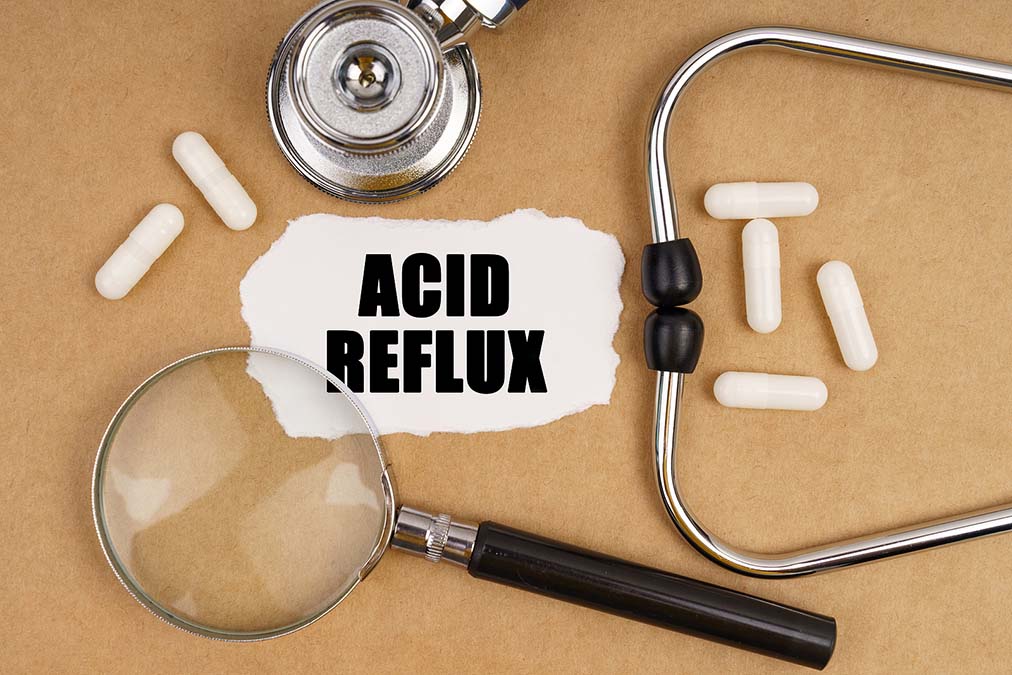 One of the best-understood effects of acid reflux is tooth erosion.
One of the best-understood effects of acid reflux is tooth erosion.
So it’s important to treat acid reflux to save your teeth, right?
It’s not so simple, says a new doctoral dissertation submitted to the State University of New York at Buffalo. Because the most common drug to treat acid reflux has been found to completely destroy your teeth.
It is obvious that acid reflux is bad for your teeth. Your stomach acid has a pH of 1.5, which is extremely acidic, almost as much as battery acid.
This acidity is crucial for degrading your food, especially proteins and potentially harmful organisms that might be in your food. While your stomach lining is resistant to this acid, the lining of your esophagus and the structures in your throat and mouth are not.
This is why, in addition to damaging your esophagus and throat, acid reflux can cause tooth erosion. The acid that washes up into your mouth is so acidic that it starts to break down your teeth.
The most frequently prescribed drugs for acid reflux are proton pump inhibitors (PPIs) that prevent your stomach from producing so much acid.
A doctoral student in New York, who wondered whether PPIs solved this problem, carried out a review of the existing literature, identifying 20 studies that investigate the relationship between PPIs and the quality of the bone and tissue that secure teeth and dental implants.
Most of the surveyed studies found that PPI users were more likely than non-users to lose teeth and dental implants. They were also more likely to have gum disease, which was probably responsible for the loss of teeth.
Most of the studies regarded dental implants and demonstrated that implant failure was 2.5 to 4.6 times more likely in PPI users. The studies that tested bone loss specifically found several millimeters of bone loss in the mouths of the PPI users.
There are several reasons for these findings:
-
1. Reduced stomach acid decreases the absorption of calcium in your small intestine. Calcium is necessary for bone formation, so too little calcium means thinner bones.
2. PPIs work by blocking proton pumps, the type of cell in your stomach that produces acid. But osteoclasts, one type of cell in your body that is responsible for bone formation, also contain proton pumps that are then blocked from operating properly.
3. Because stomach acid destroys some bacteria that are harmful in large quantities in your gastrointestinal tract, PPIs allow these bacteria to flourish, not just in the intestines, but also in the mouth, where research has established higher numbers of bacteria in PPI users. Because your immune system uses inflammation to destroy these bacteria, that inflammation can then destroy your gums.
Therefore, if you want to hold onto your teeth, steer clear of PPIs.

 Overcoming IBD
Overcoming IBD Multiple Sclerosis
Multiple Sclerosis Banishing Bronchitis
Banishing Bronchitis Gum Disease Gone
Gum Disease Gone Overcoming Onychomycosis
Overcoming Onychomycosis Neuropathy No More
Neuropathy No More The Prostate Protocol
The Prostate Protocol Brain Booster
Brain Booster
 Ironbound
Ironbound
 Solution for Shingles
Solution for Shingles
 The Bone Density Solution
The Bone Density Solution
 The Ultimate Healing Protocol
The Ultimate Healing Protocol
 The Parkinson's Protocol
The Parkinson's Protocol
 The Chronic Kidney Disease Solution
The Chronic Kidney Disease Solution
 Overthrowing Anxiety
Overthrowing Anxiety The Fatty Liver Solution
The Fatty Liver Solution The Hypothyroidism Solution
The Hypothyroidism Solution
 The End of Gout
The End of Gout The Blood Pressure Program
The Blood Pressure Program
 The Oxigized Cholesterol Strategy
The Oxigized Cholesterol Strategy
 Stop Snoring And Sleep Apnea Program
Stop Snoring And Sleep Apnea Program
 The Arthritis Strategy
The Arthritis Strategy The Vertigo & Dizziness Program
The Vertigo & Dizziness Program The 3-Step Diabetes Strategy
The 3-Step Diabetes Strategy Hemorrhoids Healing Protocol
Hemorrhoids Healing Protocol The Erectile Dysfunction Master
The Erectile Dysfunction Master Weight Loss Breeze
Weight Loss Breeze The IBS Program
The IBS Program The Insomnia Program
The Insomnia Program The Migraine and Headache Program
The Migraine and Headache Program The Neck Pain Solution
The Neck Pain Solution The Menopause Solution
The Menopause Solution The Ejaculation Master
The Ejaculation Master The TMJ Solution
The TMJ Solution The Acid Reflux Solution
The Acid Reflux Solution The Fibromyalgia Solution
The Fibromyalgia Solution The Psoriasis Strategy
The Psoriasis Strategy